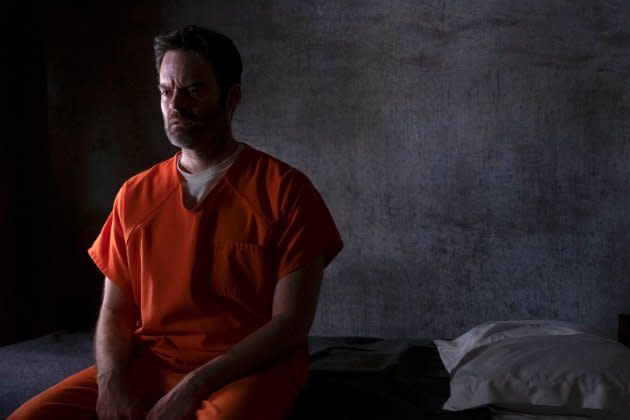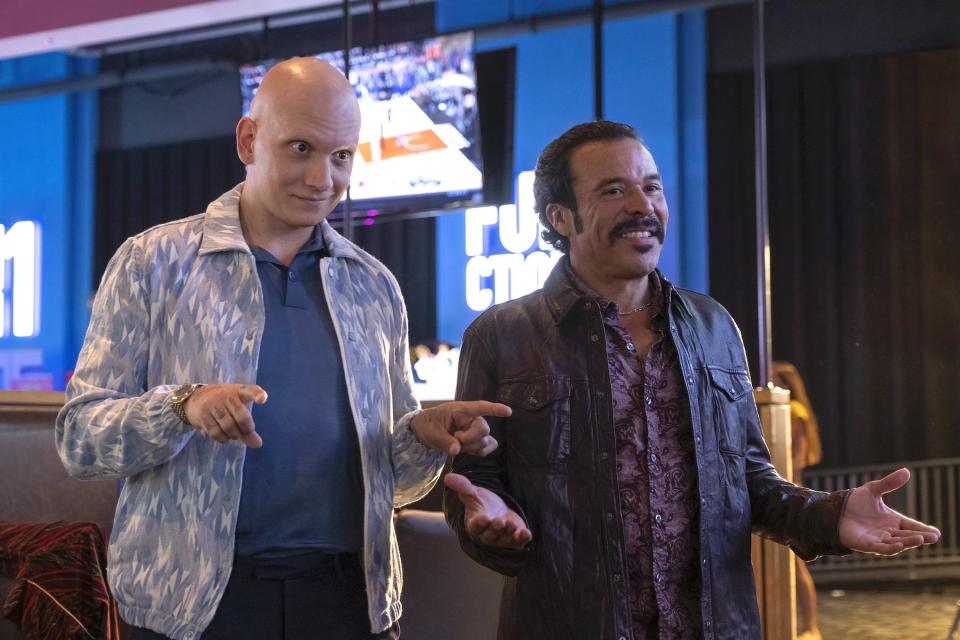‘Barry’ Goes Out on Its Own Terms in Deliciously Dark Season 4
- Oops!Something went wrong.Please try again later.
- Oops!Something went wrong.Please try again later.
- Oops!Something went wrong.Please try again later.

Early in the new season of Barry, the show’s title character is told that while he has done bad things, “I’m sure you’re not a bad guy.” This is among the most clichéd sentiments of a 21st century television littered with stories of monstrous actions committed by seemingly less-than-monstrous individuals.
Barry has never been exactly that. Despite sharing DNA with the Walter Whites of the TV world, the series has felt wholly original from the jump, even as it’s evolved from Hollywood satire into something much darker and deeper. And it is very much going out on its own terms with its incredible fourth and final season.
More from Rolling Stone
Alex Gibney Talks His Top-Secret Elon Musk Doc, 'Boom! Boom!' and Tom Cruise
'Succession': Every Logan Roy 'F*ck Off!' Ranked From Worst to Best
Return of the Roys: How to Stream 'Succession' Season Four Online
When it began, the series was primarily mocking the business that star Bill Hader (who co-created it with Alec Berg) had chosen. Barry (Hader), who has been working as a hitman around the Midwest with family friend Fuches (Stephen Root) functioning as his agent, goes to Los Angeles to assassinate someone on behalf of the Chechen mob, and accidentally finds himself in an acting class taught by narcissistic never-was Gene Cousineau (Henry Winkler). The series quickly began to suggest that there was little difference between killing on screen and killing in real life, that show business could be as cruel and capricious as organized crime, and that wiseguys could be as ridiculous and fame-obsessed as any actor or talent agent.
Hader, previously best known for spot-on SNL celebrity parodies, was now playing a man who only knew how to impersonate being a human being. This was played at first largely for laughs, particularly as he found himself confused but intrigued by life in Hollywood. But as Barry began working on his craft with the help of Gene and new girlfriend Sally (Sarah Goldberg), he was forced to confront emotions and memories he had long-ago suppressed, and to recognize that murder-for-hire is not an acceptable profession on any level.
That combination of raw drama and absurd humor is an incredibly delicate one. The balance was off for most of the show’s second season, with the two halves of the show feeling largely separate from one another. Perhaps, it seemed, Barry would have been better off as a one-and-done, ending on the thematically perfect note of Barry murdering Gene’s cop-girlfriend Janice Moss, then rationalizing that he was finished with that for good. Season Three, though, was a strong return to form — if anything, it was better than the first.
The series had always acknowledged the psychic damage that violence inflicts not only on the victims, but the people who care about them, and even at times on their abusers. The third season pushed this idea even more to the forefront, to the point where this is perhaps the best show to cover it since The Sopranos. But it also managed to lace the humor back into that exploration, so that, for instance, Sally could grapple with memories of an abusive relationship even as she was navigating the lunacies of the streaming TV industry. Hader began directing even more frequently (and is the final season’s sole director), and continually found ways to create action and suspense set pieces that managed to be both genuinely terrifying and Looney Tunes-esque. (I’m still amazed he managed to pull off last season’s freeway dirtbike chase, both logistically and tonally.) The finale — where Gene worked with Janice’s interrogator father Jim (Robert Wisdom) to get Barry arrested, while Barry’s usually happy-go-lucky Chechen contact NoHo Hank (Anthony Carrigan) was threatened by a jungle cat while handcuffed to a radiator — was a masterpiece.
And now we have this farewell season. If Season Three proved there was more life in the concept than it appeared at first, Barry is still not a series built to run forever. Credit to Hader and Berg for recognizing this, and for making a final run of episodes(*) that feels true to the spirit and ideas that have typified Barry at its best.
(*) At least, until the finale, which critics have yet to see.
The new season opens shortly after the events of last year’s finale. Barry is in jail, incarcerated alongside Fuches, who previously was blamed for many of Barry’s crimes. Sally has flown home to Joplin, still traumatized and scared after beating to death a man who was trying to kill Barry. Gene Cousineau is being feted as a hero, while NoHo Hank and his lover Cristobal (Michael Irby) are seeking some downtime after the trauma both suffered in Cristobal’s native Bolivia. Recent events have damaged them all — even Gene can take only so much pleasure from a newfound celebrity that comes off the back of his girlfriend’s murder — and no one can quite let go of what they’ve done, and/or what’s been done to them. Some of them — NoHo Hank and Fuches in particular — may seem stronger and more dangerous, but only after enduring more pain than even the worst person should.
Beyond the world knowing who and what Barry Berkman is, the season’s biggest change is how easily and forcefully Barry is able to access and express his own feelings. In previous years, he had to be nudged by Gene or Sally into exploring his inner self, and even then he only sometimes understood those emotions. Here, with nothing to hide, no one to support him, and knowledge of how many people want to destroy him, he is a tormented, and often furious person. In some ways, this is even scarier than when he was largely oblivious to anything but the particular task at hand. But in others, he feels more vulnerable and confused than ever. It’s another virtuoso performance by Hader, even as his alter ego’s acting career is finished.

Yet Hader’s greatest contribution to the series may be off-screen, as both writer and, especially, director. Even in this more serious phase of the story, there’s ample humor, as scenes often end with an unexpected joke that completely recontextualizes what you thought was happening. The fear that Jim Moss instills in every person he meets remains a boundless reservoir of unnerving comedy, and Hader continues to find ways to film action in ways that perfectly straddle the line between exciting and utterly stupid.
There’s one episode, set largely away from Los Angeles, that doesn’t quite work. It’s necessary for the plot of the season, but drags in a way that so many recent cable and streaming departure episodes(*) do not. Beyond that, though, it’s a season that feels both surprising and inevitable. Multiple chickens come home to roost, but almost never in the way you assume they will. It’s much heavier than the show was when it started, but it still manages to be a comedy a good chunk of the time.
(*) This is a reminder from your friendly neighborhood TV critic: an episode that breaks the format of a show in some way, and/or is especially distinctive, is not automatically a bottle episode. A bottle episode is specifically one that takes place entirely on pre-existing sets, featuring few, if any, guest stars in an attempt to save money. The Brooklyn Nine-Nine episode where Jake and Captain Holt interrogate a suspect for the entire time is a bottle episode; The Last of Us episode about Bill and Frank is not. Words and phrases have meaning. That is all.
In one episode, an unfortunate turn of events results in Barry saying, “OK, now I’m getting sad.” While it will be sad to not experience the incredible creative highs of Barry after this spring, it’s hard to feel too disappointed about a great show leaving on its own terms. Barry has long since stopped trying to be an actor, but showmanship is still very much on the mind of the series named for him. And every performer hopes to leave the audience wanting more.
The final season of Barry premieres with two episodes on April 16 on HBO and HBO Max, with additional episodes releasing weekly. I’ve seen the first seven episodes.
Best of Rolling Stone

